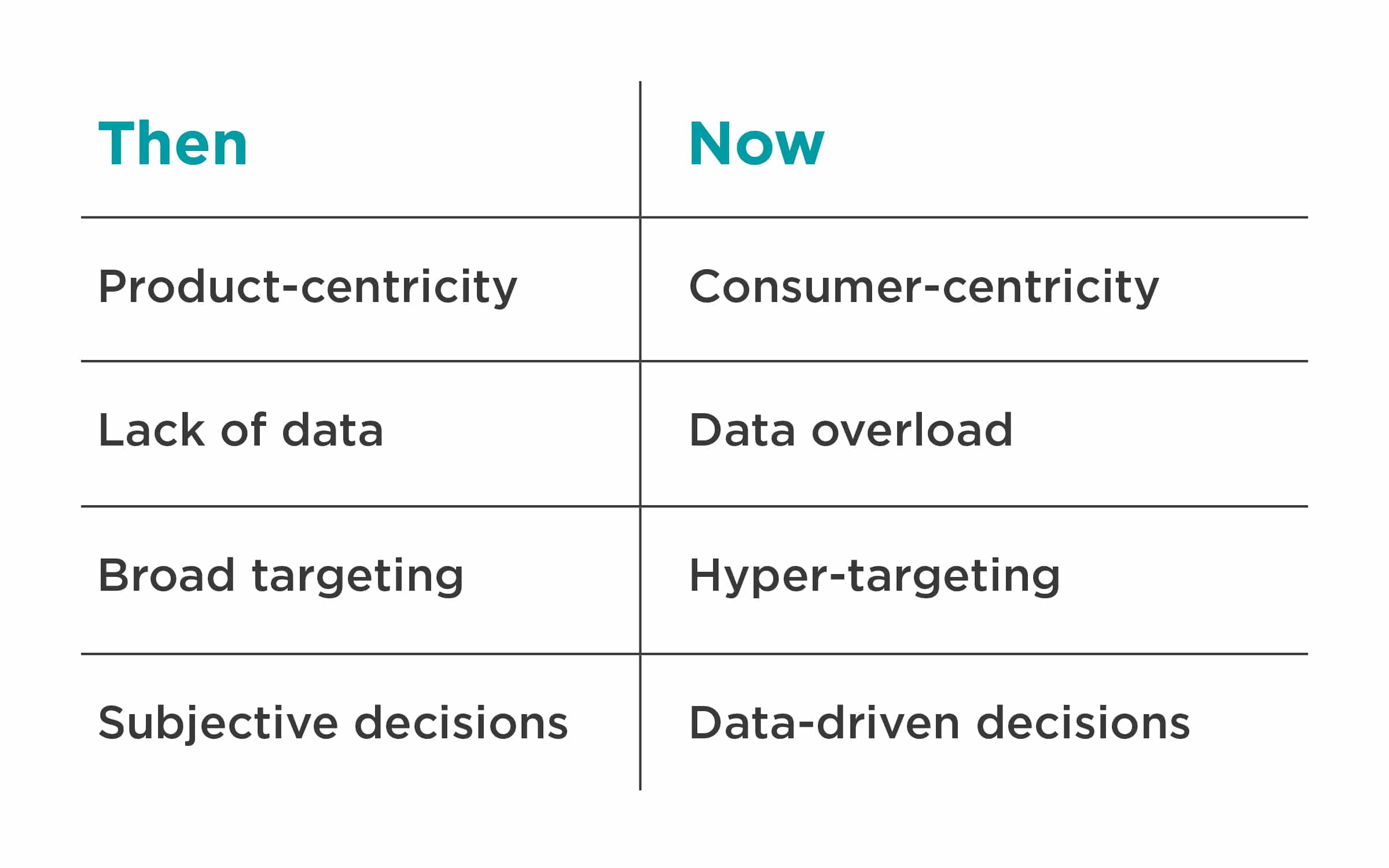Why consumer insights are so important in marketing

Brands have a tough job on their hands marketing to their audience in today’s climate. More so now, as audiences comprise a complex mixture of several generations. Baby boomers, Gen X, Millennials, Gen Z – each generation comes with their own particular wants and needs. While some brands will want to target just one or two of these, many companies’ target audiences span all generations, and it’s imperative they understand the nuances of each in order to market to them as effectively as possible.
This is where detailed consumer insight comes in.
There is more competition across more channels than ever before. What may work for one audience won’t necessarily work for all. With numerous and varied influences on purchase decisions today, through consumer insights, brands must identify which marketing communications and channels will resonate most powerfully with their target audiences.
Today we have access to vast (some might say limitless) amounts of data. But just because brands have access to this data, doesn’t mean they have insight – it’s the deeper research into this data that brands can leverage to gain a unique advantage over their competition.
What is consumer insight in marketing?
Consumer insight is the analysis and interpretation of human behaviour and trends, undertaken by brands to truly understand their audience(s) and improve the effectiveness of targeted marketing efforts. The insight can also delve deep into anthropology and ethnography to uncover societal and cultural drivers, to better understand the ‘why’ behind consumer actions and behaviour.
Consumer insights and intelligence are best gathered from a variety of sources on an ongoing basis, to provide a qualitative and 360 ̊ view of your audiences. Methods of gaining consumer insights can include interviews, surveys, focus groups, Google Analytics, competitor consumer insight and social listening.
2020 presented challenges both personal and professional, and forced all of us to adapt. Back in 2019, three quarters of brands interviewed by the IPA had increased investment in marketing effectiveness in the previous three years, and one third of brands had set up specialist marketing effectiveness units.
The pandemic has only accelerated the uptake of consumer insight. Such rapid rate of global change (online spend vs in-store spend, the shift away from using plastics, working from home, to name but a few), has had an impact on consumer behaviour and how individuals interact with brands. Astute businesses understand that they need to be more competitive in order to thrive. Extracting consumer insight can give brands the critical edge, through a more solid understanding of their target audience and their motivations.
Consumer insight research enables businesses to develop informed consumer marketing strategies to deliver on their objectives more effectively and efficiently. It also allows brands to switch their efforts from mass marketing to personalised, tailored marketing. By focusing and prioritising in this way, brands can drive greater consumer engagement, conversions and ROI.
Consumer insight can also delve deep into anthropology and ethnography to uncover societal and cultural drivers
B2C vs B2B consumer insights
It’s important to note the nuances when marketing to B2B vs B2C markets – particularly the shift B2B marketing has encountered with the advent of emerging digital technologies. How and where you communicate to B2B and B2C customers requires a different approach, yet there are general marketing practices that apply to both markets.
Research by Global Web Index found that customer journeys have become increasingly fragmented with the development of technologies and the opening up of new channels. This applies to both B2C and B2B markets, and cements the need for brands across the board to personalise their marketing efforts. Personalisation can only be effective when based on intelligent consumer insight.
Previously, the B2B purchase process tended to be rationally and logically driven, while consumer choices were typically emotionally triggered. However, a recent report by Accenture highlighted that in today’s climate, B2B customers are increasingly demanding and want the same level of hyper-personalised service as they receive in B2C channels.
Yet interestingly, the report also noted that only 36% of B2B companies collect customer feedback, compared to 61% of B2C companies. In both B2B and B2C marketing, customers value the perception and emotionality of a brand, over the product or service. So there is a clear gap to close, and a need for B2B brands to invest in both existing and prospective consumer insight.
Only 36% of B2B companies collect customer feedback, compared to 61% of B2C companies
Precision marketing
Forward thinking brands understand the importance of putting the consumer at the centre of their brand and marketing strategies. Unlocking the data available allows brands to make intelligent decisions and be extremely targeted in their approach. This enables precision marketing, which drives marketing effectiveness and ROI.

A great example of this, is Three’s ‘Holiday Spam’ campaign which originated by tracking the mobile data usage of a group of customers abroad. Three found that customers used 71 times the amount of data they would have used had they been charged as normal – most of which was used to post holiday snaps on social media. The award winning ‘Holiday Spam’ campaign resulted in a 90% increase in Three’s social conversation volume and customers saved a £2.7bn in roaming charges.
Key benefits to consumer insight research
- Helps to develop tailored marketing strategies
Ongoing consumer insight research focuses efforts. Knowing what drives a customer’s purchase decision, where and when they shop, how they like to be spoken to, what external factors affect their spending habits…all of this equips brands with a deeper understanding of their customers, meaning they can create highly personalised and targeted brand and marketing strategies.Many a marketing budget can be wasted by skipping this step. It’s much better to lay the foundations with solid research and insight, so that brands can identify real solutions to their customers’ problems, and engage with them in the most effective way. In fact, according to Forbes, 73% of companies with above-average customer experience perform better financially than their competitors. Furthermore, brands with superior customer experience bring in 5.7 times more revenue than competitors that lag in customer experience. - Enables better briefing for your design agency
You’ve researched your target audiences, identified their key drivers to purchase and mapped out your marketing objectives. From here you have a great platform to brief everyone involved in getting your marketing communications out the door. It’s essential to know your design agency is on the same page and has all of the necessary consumer insights to interpret and create a truly made-to-measure marketing campaign. Of course, this doesn’t just apply to your agency, but to any partners or third-party suppliers too. Creating less friction between all involved, leads to higher productivity, and a greater likelihood of getting it right the first time. - Drives efficiencies
Once you understand why your customers behave and act in a particular way, it’s easier for brands to justify marketing spend on certain channels and communications. Processes become slicker, and less time is wasted on guesswork. It goes without saying, solid consumer insight research drives efficiency, and when done well, can result in higher ROMI, and attribution can be more accurately inferred. - Prepares and protects for the future
Change in consumer behaviour is not only happening, it’s accelerating. Technological developments continue to impact shopping habits, and less agile, reactive brands get left behind seemingly overnight. As trends evolve rapidly, consumer insight research can account for some of these changes, and prepare brands better for adaptation and informed response to these behavioural shifts. - Can open up new growth opportunities
Understanding your consumers and studying them more closely, can lead to cross-selling opportunities and even open up new, untapped audiences. Consumer insight can identify the need for new product development, which as a result can be undertaken with a more focused objective. Product testing on consumer focus groups can help you launch your products (or services) having ironed out the kinks, giving your customers exactly what they are asking for. - Consumers like being heard
Consumers like brands that take the time to understand them, it makes them feel valued and loved. Consumer insight can make up a very valuable part of a customer’s brand experience. Rather than being told what they should buy, feeling that they’re involved in a two-way conversation builds strong brand trust. With such choice for consumers nowadays, brands that show empathy towards their audience gain an invaluable competitive advantage. What’s more, another report by PWC found that 42% would pay more for a friendly, welcoming experience and factors of speed, convenience, helpful employees and friendly service matter most, each hitting over 70% in importance to consumers.
Check your sources
All things considered, there is a lot of data available at our fingertips today, but not all of it is good data. Be careful where you source your consumer insight from, and ensure your sources are credible. Often, there’s more value in paying for data, so don’t rule out subscriptions or paid-for reports and publications to tap into precious insight on your consumers and audiences.
Final thoughts
In this ever-competitive world, it’s crucial that you conduct consumer insight research, to ensure you create targeted and relevant communications that will resonate with your consumers. Only once you have this full data-driven understanding of your consumer, can you create highly effective and engaging marketing campaigns targeted specifically to them.
For up to date news in strategy and insight, read our latest Articles. Alternatively, if you have any questions about how to undertake or get the most out of your consumer insight then get in touch with us. We’d love to help.